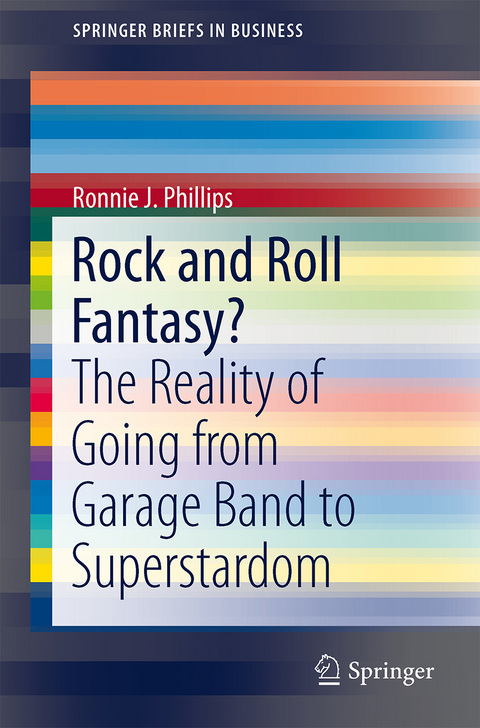
Rock and Roll Fantasy?
The Reality of Going from Garage Band to Superstardom
Seiten
2012
Springer-Verlag New York Inc.
978-1-4614-5899-9 (ISBN)
Springer-Verlag New York Inc.
978-1-4614-5899-9 (ISBN)
We are in an era where developments in both technology and musical style have coalesced to produce greatest period of change in music industry since the invention of recorded sound. Integrating insights from economics, management, and intellectual property law, the author explores the dynamics of entrepreneurship and innovation in music industry.
We are in an era where developments in both technology and musical style have coalesced to produce the greatest period of change in the music industry since the invention of recorded sound. Globalization, the Internet, and digital technology are now opening up possibilities for more artists to be innovative and financially successful. But new music requires new ways of doing business. For more artists to be better off requires new business models to replace those that dominated the 20th century. Integrating insights from economics, management, and intellectual property law, the author explores the dynamics of entrepreneurship and innovation in the music industry, and offers such provocative assessments as these:
· The Beatles might never have broken up if they had the kind of two-tier contracts – as band members and as solo artists – that are common in the music industry today.
· Buddy Holly would likely have avoided his tragic death in a plane crash at age 22 if his 1959 tour had been sponsored by a company like Coca Cola because today’s corporatized tours are vastly better financed and organized than the haphazard efforts of the 1950s.
· The economic value of albums by the likes of Elvis and Michael Jackson has risen significantly since their deaths – the ironic byproduct of the way their behavior tarnished their own brands while they were alive.
· Diana Ross might never have quit The Supremes if she had known that one-third of the artists in the 1960s who quit the group had charting careers ofonly one year.
· Thomas Edison’s invention of the phonograph led to the modern record industry, but he is really the godfather of computer programs like Garageband which have created home recording studios.
The collapse of the Soviet Union threatened the sound of rock and roll but an American entrepreneur saved the day.
We are in an era where developments in both technology and musical style have coalesced to produce the greatest period of change in the music industry since the invention of recorded sound. Globalization, the Internet, and digital technology are now opening up possibilities for more artists to be innovative and financially successful. But new music requires new ways of doing business. For more artists to be better off requires new business models to replace those that dominated the 20th century. Integrating insights from economics, management, and intellectual property law, the author explores the dynamics of entrepreneurship and innovation in the music industry, and offers such provocative assessments as these:
· The Beatles might never have broken up if they had the kind of two-tier contracts – as band members and as solo artists – that are common in the music industry today.
· Buddy Holly would likely have avoided his tragic death in a plane crash at age 22 if his 1959 tour had been sponsored by a company like Coca Cola because today’s corporatized tours are vastly better financed and organized than the haphazard efforts of the 1950s.
· The economic value of albums by the likes of Elvis and Michael Jackson has risen significantly since their deaths – the ironic byproduct of the way their behavior tarnished their own brands while they were alive.
· Diana Ross might never have quit The Supremes if she had known that one-third of the artists in the 1960s who quit the group had charting careers ofonly one year.
· Thomas Edison’s invention of the phonograph led to the modern record industry, but he is really the godfather of computer programs like Garageband which have created home recording studios.
The collapse of the Soviet Union threatened the sound of rock and roll but an American entrepreneur saved the day.
Prologue:Who Killed Buddy
Holly?.- 1. So You Want to Be a Rock and Roll Star?.- 2. Hitsville:
Writing a Hit Song.- 3. Innovation: Will You Ever Hear Surf Music Again?.- 4. Contracts:
You Never Give Me Your Money, All I Get Is Your Funny Paper.- 5. Live
Performance: Touring Can Make You Crazy.- 6. Death: Elvis
Has Just Left the Building.- 7. The Technological Entrepreneurs:
Engineers, Accountants, and Hippies.- 8. Absolutely Free: Only
If You Want It to Be!.- Epilogue: Is Rock and Roll Here to Stay?.- References.- Index.-
Song Index.
| Erscheint lt. Verlag | 17.11.2012 |
|---|---|
| Reihe/Serie | SpringerBriefs in Business ; 35 |
| Zusatzinfo | 13 Illustrations, color; 6 Illustrations, black and white; XXIII, 124 p. 19 illus., 13 illus. in color. |
| Verlagsort | New York, NY |
| Sprache | englisch |
| Maße | 155 x 235 mm |
| Themenwelt | Kunst / Musik / Theater ► Theater / Ballett |
| Recht / Steuern ► EU / Internationales Recht | |
| Recht / Steuern ► Privatrecht / Bürgerliches Recht ► Medienrecht | |
| Wirtschaft ► Betriebswirtschaft / Management ► Unternehmensführung / Management | |
| ISBN-10 | 1-4614-5899-4 / 1461458994 |
| ISBN-13 | 978-1-4614-5899-9 / 9781461458999 |
| Zustand | Neuware |
| Haben Sie eine Frage zum Produkt? |
Mehr entdecken
aus dem Bereich
aus dem Bereich
Recherche, Darstellung und Haftung im Recht der Medien
Buch | Hardcover (2024)
Verlag Dr. Otto Schmidt KG
CHF 179,95
Lehrbuch des gesamten Medienrechts unter besonderer Berücksichtigung …
Buch | Softcover (2023)
UTB (Verlag)
CHF 30,80


